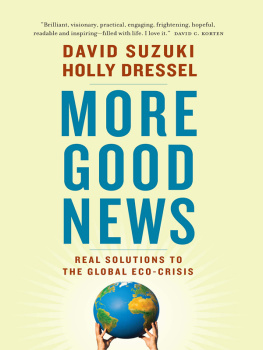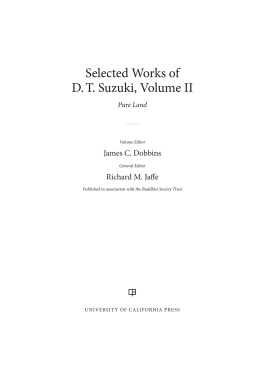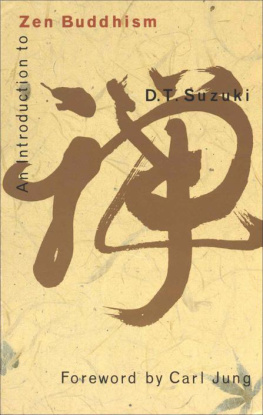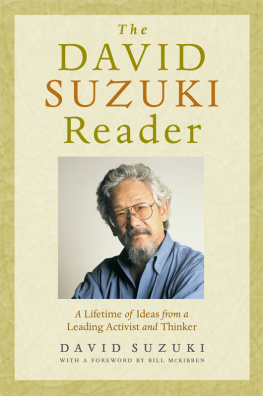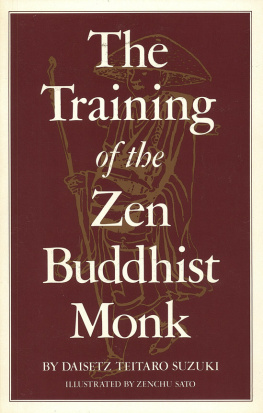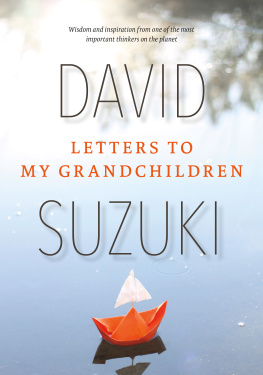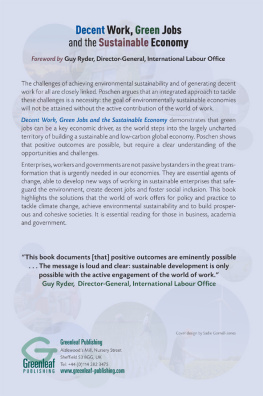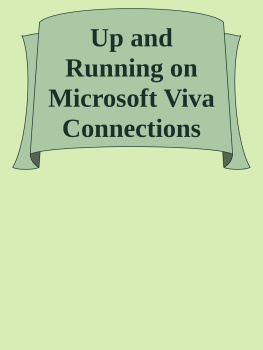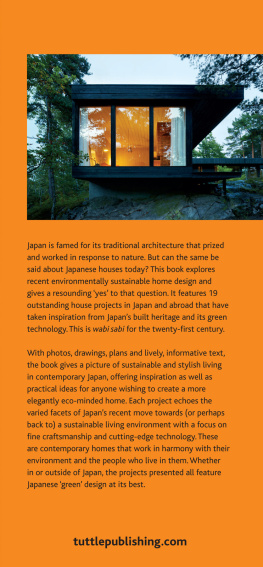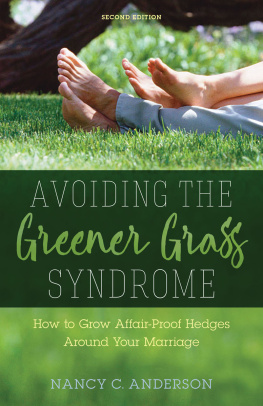Suzuki - More Good News: Real Solutions to the Global Eco-Crisis
Here you can read online Suzuki - More Good News: Real Solutions to the Global Eco-Crisis full text of the book (entire story) in english for free. Download pdf and epub, get meaning, cover and reviews about this ebook. City: Nanoose Bay, year: 2010;2014, publisher: Douglas & McIntyre;Greystone Books, genre: Politics. Description of the work, (preface) as well as reviews are available. Best literature library LitArk.com created for fans of good reading and offers a wide selection of genres:
Romance novel
Science fiction
Adventure
Detective
Science
History
Home and family
Prose
Art
Politics
Computer
Non-fiction
Religion
Business
Children
Humor
Choose a favorite category and find really read worthwhile books. Enjoy immersion in the world of imagination, feel the emotions of the characters or learn something new for yourself, make an fascinating discovery.
More Good News: Real Solutions to the Global Eco-Crisis: summary, description and annotation
We offer to read an annotation, description, summary or preface (depends on what the author of the book "More Good News: Real Solutions to the Global Eco-Crisis" wrote himself). If you haven't found the necessary information about the book — write in the comments, we will try to find it.
More Good News: Real Solutions to the Global Eco-Crisis — read online for free the complete book (whole text) full work
Below is the text of the book, divided by pages. System saving the place of the last page read, allows you to conveniently read the book "More Good News: Real Solutions to the Global Eco-Crisis" online for free, without having to search again every time where you left off. Put a bookmark, and you can go to the page where you finished reading at any time.
Font size:
Interval:
Bookmark:
More Good News
DAVID SUZUKI
HOLLY DRESSEL
MORE
GOOD
NEWS
REAL SOLUTIONS TO THE
GLOBAL ECO-CRISIS

Copyright 2002, 2010 by David Suzuki and Holly Dressel
10 11 12 13 14 5 4 3 2 1
All rights reserved. No part of this book may be reproduced,
stored in a retrieval system or transmitted, in any form or by any means,
without the prior written consent of the publisher or a license from
The Canadian Copyright Licensing Agency (Access Copyright).
For a copyright license, visit www.accesscopyright.ca
or call toll free to 1-800-893-5777.
Greystone Books
An imprint of D&M Publishers Inc.
2323 Quebec Street, Suite 201
Vancouver BC Canada V5T 4S7
www.greystonebooks.com
David Suzuki Foundation
2192211 West 4th Avenue
Vancouver BC Canada V6K 4S2
Cataloguing data available from Library and Archives Canada
ISBN 978-1-55365-475-9 (pbk.) ISBN 978-1-55365-625-8 (ebook)
Cover design by Ingrid Paulson
Text design by Heather Pringle
Cover illustration Masterfile
Printed and bound in Canada by Friesens
Text printed on 100% post-consumer,
acid-free, FSC-certified paper
Distributed in the U.S. by Publishers Group West
We gratefully acknowledge the financial support
of the Canada Council for the Arts, the British Columbia Arts Council,
the Province of British Columbia through the Book Publishing Tax Credit,
and the Government of Canada through the Canada Book Fund
for our publishing activities.

CONTENTS
As in any work of this kind, it would be impossible to thank the scores of people who gave selflessly of their precious time and expertise to answer calls and queries, to send information, to find books. At the very beginning of this project, Kristen Werring, a wonderful volunteer at the David Suzuki Foundation, lent her talents to making sure our websites and references were all existent and up-to-date. We want to thank our publishers for their patience in dealing with a large and unwieldy early manuscript. Thank you so much Rob, Nancy, and especially our editors, Barbara Tomlin and Iva Cheung. Barbaras kindness, availability, and deep understanding of the books intent, as well as her clear interest in the issues involved, made the difficult work of refining and editing a joy. Ivas brilliance at ferreting out embarrassing mistakes or omissions, as well as clarifying thoughts, was just as deeply appreciated. We are very grateful for being the recipients of the gentle professionalism of these editors. David wishes to thank Tara Cullis, for all her support in giving me time to write and for her input on the forestry chapter. My right-hand person, Elois Yaxley, keeps the forces of entropy at bay in our office. Holly Dressel would like to thank Ryan Young, who threw references her way, loaned books with abandon, and was also a consultant on many key issues. James Latteier read Hollys earliest manuscripts and helped with corrections and especially morale. She would also like to mention the unwavering support she has been given over this period by Peter Brown, Elizabeth May, and Christine von Weizsaecker, as well as by her friends Stuart Myiow Jr. and Sr. Hollys daughter, Thea Toole, and daughter-in-law, Amy Stolecki are local environmental activists and provided invaluable primary research on sludge and other solid waste issues. And most of all, Holly is grateful for my two grandsons, Parker and Owen, who provided desperately needed cookie, cartoon, and hide-and-seek breaks. It is to them and to all the other children, of today and tomorrow, that we both offer this work.
Are there real alternatives to the human activities that undermine the biospheres life-supporting systemsalternatives that are not just about recycling and riding the bus but that represent substantive shifts in our perspectives, values, and goals?
Thats what we set out to discover when we began work on GoodNews for a Change back in 2000. At that time we worked hard to discover examples of the changes the world needed and to outline real sustainability criteria: principles that people could follow to devise and recognize solutions to environmental problems. Since then reports of ecological collapse have increased in number, capturing public attention and urging people and governments to more quickly adopt the existing solutions. We have now combined those original sustainability principles with new examples in order to impel faster movement along a clear path.
Although people must continue acting to save the planets failing ecosystems, it is just as vital to distinguish actions that are theoretically helpful from actions that truly benefit natural systems. Sometimes exciting green solutions, such as biofuel production, can cause more harm than good. Conservationists and concerned citizens everywhere must use clear criteria to judge what actually keeps a particular ecosystem in balance, given each ones staggering complexity. Unlike most books about environmental solutions written at that time, ours was not enthusiastic about agricultural biofuels, because growing fuel on finite agricultural land to feed infinite human desires for energy did not (and still does not) fit our sustainability criteria. Within only two crop seasons, subsidies favoring biofuels began to destabilize food prices and destroy ecosystems around the world.
Our recommendations now, as in the first edition of this book, are based on science, which acknowledges that natural systems are not part of human culture; we are part of natural systems. The ecosystems that keep us alive pay no attention to human aspirations, needs, or laws. A nation might work out the most elegant carbon-trading program imaginable, one that takes into account all the necessary political and economic realities. Yet if that program doesnt lower greenhouse gas emissions fast enough, the climate wont pay any attention to such efforts. That hard fact means that we must try to understand what forests and water bodies really need in order to maintain their ability to regulate this planets atmosphere and climate.
As well as using the best available scientific research, we have turned to the most established experts on the biospheres needs the local people who depend upon, live within, and therefore have paid very close attention to natural ecosystems. It is in the work done by scientists and local people that the most hope for saving the planet is growing. More scientists are recognizing natural complexity and, with it, the fact that humans do not understand ecosystems well enough to manage them sustainably. So far science hasnt been able to isolate or understand most of the components of healthy ecosystems, let alone comprehend how they are interconnected. The entire science of conservation is learning humility, and that includes turning to history to see what human groups have done in the past that was demonstrably successful. Today academic and governmental experts are acknowledging that the local, traditional, and aboriginal peoples who still live within the planets remaining functioning ecosystems are most able to tell us what these systems require. These groups talk about respect, restraint, and listening to the land. Research is confirming that this is very good advice for saving the biospherethat people have a better chance of learning to manage human behavior than they have of managing the infinitely linked ecosystems that support us. This is a lesson that both authors of
Next pageFont size:
Interval:
Bookmark:
Similar books «More Good News: Real Solutions to the Global Eco-Crisis»
Look at similar books to More Good News: Real Solutions to the Global Eco-Crisis. We have selected literature similar in name and meaning in the hope of providing readers with more options to find new, interesting, not yet read works.
Discussion, reviews of the book More Good News: Real Solutions to the Global Eco-Crisis and just readers' own opinions. Leave your comments, write what you think about the work, its meaning or the main characters. Specify what exactly you liked and what you didn't like, and why you think so.

